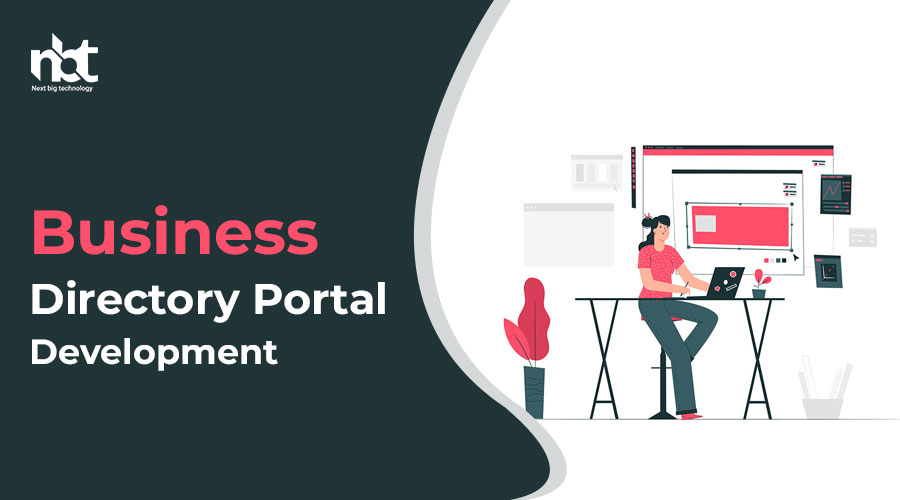Table of Contents
Business Directory Portal Development Services
In today’s digital era, where connectivity is key and visibility is paramount, businesses strive to expand their reach and maximize their online presence. One indispensable tool in achieving this goal is a well-designed business directory portal. These portals serve as virtual platforms where companies can showcase their products, services, and credentials to a vast audience, thereby enhancing their brand visibility and attracting potential customers.
Business directory portal development services offer a comprehensive solution for businesses looking to establish a strong online presence. Whether it’s a niche-specific directory or a broad industry platform, these services cater to the diverse needs of businesses across various sectors. By leveraging cutting-edge technologies and innovative design strategies, they create dynamic and user-friendly portals that streamline the process of connecting businesses with their target audience.
One of the key benefits of investing in business directory portal development services is the ability to tap into a vast network of potential customers. These portals act as centralized hubs where businesses can be easily discovered by individuals searching for specific products or services. By listing their business on these platforms, companies can significantly expand their customer base and increase their chances of generating leads and conversions.
Moreover, business directory portals offer valuable features such as advanced search functionalities, user reviews, and ratings, which help users make informed decisions when selecting a product or service provider. This not only enhances the user experience but also builds trust and credibility for the businesses listed on the portal.
From a strategic standpoint, business directory portal development services enable businesses to stay ahead of the competition by positioning themselves as industry leaders. By showcasing their expertise, achievements, and unique selling points on these portals, companies can differentiate themselves from their competitors and attract the attention of potential customers.
Additionally, business directory portals serve as powerful marketing tools, allowing businesses to promote their offerings through targeted advertising and sponsored listings. This ensures maximum visibility for their products or services, thereby driving traffic to their websites and increasing sales opportunities.
How to Create a Business Directory Portal Development
In the ever-evolving digital landscape, the importance of online presence for businesses cannot be overstated. Whether it’s a local mom-and-pop shop or a global enterprise, having a solid online presence is crucial for success. One effective way to boost visibility and facilitate connections between businesses and consumers is through a business directory portal. In this guide, we’ll explore the ins and outs of creating a business directory portal, from conceptualization to development.
Understanding the Concept:
Before diving into the development process, it’s essential to understand what a business directory portal is and its purpose. A business directory portal is a centralized platform that lists various businesses within specific categories or industries. Users can search for businesses based on location, industry, or specific keywords, making it easier for them to find relevant services or products.
Planning Your Portal:
- Identify Your Niche: Determine the focus of your directory portal. Will it cater to a specific industry, location, or a broad range of businesses? Identifying your niche will help you tailor your portal to meet the needs of your target audience effectively.
- Research Your Competitors: Analyze existing business directory portals in your niche. Take note of their features, user interface, and functionality. This will help you identify gaps in the market and areas where you can innovate.
- Define Your Features: Based on your niche and competitor analysis, outline the features you want to include in your portal. Common features include search functionality, user reviews, business profiles, maps, and advertising options.
Development Process:
- Choose the Right Platform: Decide whether you want to build your portal from scratch or use a pre-built solution like WordPress or Drupal. Each option has its pros and cons, so choose the one that aligns with your budget and technical expertise.
- Design and User Experience: Invest in a user-friendly design that prioritizes ease of navigation and intuitive search functionality. Make sure your portal is mobile-responsive, as many users will access it from smartphones and tablets.
- Database Management: Develop a robust database structure to store business information efficiently. Implement filters and sorting options to help users narrow down their search results effectively.
- User Registration and Profiles: Allow businesses to create profiles and manage their listings. Implement user registration and verification processes to ensure the authenticity of the listings.
- Monetization Strategies: Explore various monetization options such as paid listings, featured listings, banner ads, and affiliate marketing. Choose the ones that align with your business model and revenue goals.
Testing and Launch:
- Beta Testing: Before launching your portal to the public, conduct thorough beta testing to identify and fix any bugs or usability issues.
- Launch Strategy: Plan a marketing strategy to promote your portal effectively. Utilize social media, email marketing, and SEO techniques to attract users and businesses to your platform.
- Gather Feedback: Encourage users to provide feedback on their experience using your portal. Use this feedback to make necessary improvements and enhancements.
Maintenance and Updates:
- Regular Updates: Stay abreast of industry trends and technological advancements. Regularly update your portal with new features and improvements to keep it competitive.
- Security Measures: Implement robust security measures to protect user data and prevent unauthorized access. Regularly audit your system for vulnerabilities and address them promptly.
- Customer Support: Provide excellent customer support to address any issues or inquiries from users and businesses promptly. Building a strong rapport with your users will help foster trust and loyalty.
Why Should You Go for Business Directory Portal Development
In today’s digital age, businesses are constantly seeking new ways to enhance their online presence and reach a wider audience. One effective strategy that has gained traction in recent years is investing in business directory portal development. These online platforms serve as centralized hubs where businesses can list their services, products, and contact information, providing users with a convenient and comprehensive directory of businesses within a specific industry or location.
Here are several compelling reasons why investing in business directory portal development can be advantageous for both businesses and consumers alike:
- Increased Visibility and Exposure: By listing your business on a directory portal, you significantly increase your online visibility. Users searching for specific products or services can easily find your business among the listings, resulting in enhanced exposure and potential leads.
- Improved SEO Performance: Business directory portals are often optimized for search engines, making it easier for your business to rank higher in search results. This can lead to increased organic traffic to your website and ultimately boost your overall SEO performance.
- Targeted Marketing Opportunities: Many business directory portals allow businesses to target their listings based on specific criteria such as industry, location, or keywords. This targeted approach ensures that your business is reaching its intended audience, resulting in higher-quality leads and conversions.
- Enhanced Credibility and Trust: Being listed on reputable business directory portals can enhance your business’s credibility and trustworthiness. Users tend to trust businesses that are listed on established directories, which can help build confidence and encourage them to engage with your products or services.
- Cost-Effective Advertising: Compared to traditional advertising methods, investing in business directory portal development can be a cost-effective way to promote your business. Many directory portals offer affordable listing options, making it accessible to businesses of all sizes.
- Access to Valuable Insights: Business directory portals often provide valuable insights and analytics about user behavior, such as search trends, click-through rates, and user demographics. This data can help businesses better understand their target audience and tailor their marketing strategies accordingly.
- Networking Opportunities: Business directory portals serve as more than just a listing platform; they also provide opportunities for businesses to connect and network with other industry professionals. This can lead to valuable partnerships, collaborations, and business opportunities.
Market Prospects of Business Directory Portal Development and Platforms
In today’s digitally-driven world, businesses are constantly seeking innovative ways to enhance their online presence and expand their reach. One such avenue that has gained significant traction is the development and utilization of business directory portals. These platforms serve as comprehensive online directories, connecting businesses with potential customers and facilitating seamless interactions. As the demand for efficient networking and visibility grows, the market prospects for business directory portal development are undeniably promising.
The burgeoning significance of online visibility cannot be overstated in the current business landscape. With consumers increasingly turning to the internet to discover products and services, businesses must establish a strong online presence to remain competitive. Business directory portals provide a centralized platform for companies to showcase their offerings, making it easier for consumers to find relevant information and make informed decisions.
Furthermore, the rise of mobile technology has fueled the demand for user-friendly and accessible platforms. Business directory portals offer mobile-responsive designs and intuitive interfaces, enabling users to access vital information on the go. Whether searching for nearby restaurants, hotels, or service providers, consumers can rely on these portals to provide accurate and up-to-date listings, enhancing their overall user experience.
From a business perspective, investing in directory portal development can yield significant returns. By listing their services on these platforms, businesses can increase their visibility and reach a wider audience. Moreover, many directory portals offer advanced features such as analytics and lead generation tools, empowering businesses to track their performance and identify potential opportunities for growth.
In addition to serving as a valuable resource for consumers, business directory portals also play a crucial role in fostering collaboration within industries. By bringing together businesses from diverse sectors, these platforms facilitate networking opportunities and promote synergistic partnerships. Whether connecting with potential suppliers, distributors, or collaborators, businesses can leverage directory portals to forge valuable relationships and expand their professional network.
As the digital ecosystem continues to evolve, the market for business directory portal development is poised for significant growth. Businesses across various industries are recognizing the importance of establishing a robust online presence, driving demand for innovative directory solutions. Moreover, the proliferation of e-commerce and online transactions further underscores the need for reliable platforms that facilitate seamless interactions between businesses and consumers.
Essential Features of a Business Directory Portal Development
In the fast-paced digital landscape, a robust online presence is indispensable for businesses aiming to thrive. One integral aspect of establishing a prominent digital footprint is through a business directory portal. These portals serve as comprehensive platforms where businesses can list their services, enabling users to conveniently discover, compare, and engage with them. However, to ensure the effectiveness and competitiveness of such portals, it’s crucial to incorporate certain essential features. Let’s delve into these key components that constitute a successful business directory portal development:
- User-Friendly Interface: The foremost requirement for any online platform is a user-friendly interface. A clean, intuitive design facilitates seamless navigation for both businesses listing their services and users seeking them. Easy-to-use search and filter options streamline the process of finding relevant information, enhancing user experience.
- Advanced Search and Filter Options: A sophisticated search functionality equipped with advanced filters enables users to narrow down their search criteria based on specific parameters such as location, industry, or services offered. This feature enhances efficiency and ensures that users find precisely what they’re looking for amidst a plethora of listings.
- Mobile Responsiveness: With the proliferation of smartphones, ensuring mobile responsiveness is imperative. A responsive design adapts seamlessly to various screen sizes and devices, providing users with a consistent and optimal viewing experience across desktops, tablets, and smartphones.
- Comprehensive Business Profiles: Detailed business profiles that include essential information such as contact details, services offered, operating hours, and reviews foster transparency and trust. Businesses should have the flexibility to customize their profiles with images, descriptions, and other pertinent details to effectively showcase their offerings.
- Review and Rating System: Integrating a review and rating system empowers users to share their experiences and feedback, helping prospective customers make informed decisions. Genuine user reviews add credibility to listings and incentivize businesses to maintain high standards of quality and service.
- Integration with Maps and Geolocation: Incorporating maps and geolocation features enables users to easily locate businesses in their vicinity. Interactive maps provide visual representations of business locations, enhancing convenience and accessibility for users seeking local services.
- Multi-language Support: Catering to a diverse audience necessitates multi-language support. Offering content in multiple languages ensures inclusivity and expands the reach of the business directory portal to a global audience, fostering engagement and usability across different regions.
- Secure Payment Gateway: For portals offering premium listing services or facilitating transactions, integrating a secure payment gateway is indispensable. Users should have confidence in the security of their financial transactions, thereby fostering trust and encouraging participation.
- Analytics and Reporting Tools: Implementing analytics and reporting tools provides valuable insights into user behavior, traffic patterns, and the performance of listings. Data-driven insights enable administrators to optimize the portal, refine user experience, and tailor services to meet evolving needs.
- Scalability and Customization: Building a scalable and customizable platform ensures adaptability to changing requirements and future growth. The architecture should accommodate additional features, integrations, and enhancements, enabling seamless expansion and evolution over time.
Advanced Features Business Directory Portal Development
In the dynamic landscape of digital commerce, having a robust online presence is paramount for businesses to thrive. A business directory portal serves as a gateway for companies to showcase their offerings, connect with potential clients, and enhance their visibility in the market. With the advancement of technology, these portals have evolved significantly, offering a plethora of advanced features to streamline operations and maximize efficiency.
The Evolution of Business Directory Portals: Gone are the days of static, one-dimensional directory listings. Modern business directory portals are sophisticated platforms equipped with cutting-edge functionalities designed to meet the diverse needs of businesses and users alike.
Advanced Search and Filtering Capabilities: One of the key features of advanced business directory portals is their powerful search and filtering capabilities. Users can now easily narrow down their search based on various criteria such as location, industry, services offered, and customer ratings. This not only enhances user experience but also enables businesses to target their desired audience more effectively.
Integration of Geolocation Services: Geolocation integration is another innovative feature that enhances the user experience of business directory portals. By leveraging GPS technology, users can effortlessly locate businesses in their vicinity, making it convenient for them to find relevant services or products nearby. For businesses, this feature opens up new avenues for targeting local customers and driving foot traffic to their establishments.
Interactive Maps and Directions: Advanced business directory portals often incorporate interactive maps and directions, providing users with a visual representation of the business locations. This feature not only facilitates navigation but also helps users gain a better understanding of the geographical distribution of businesses listed on the portal. Additionally, users can get step-by-step directions to the desired business location, making it easier for them to reach their destination.
Social Media Integration: In today’s interconnected world, social media plays a pivotal role in business promotion and customer engagement. Advanced business directory portals seamlessly integrate with popular social media platforms, allowing businesses to showcase their social media profiles directly on their listings. This not only enhances brand visibility but also encourages social sharing and word-of-mouth referrals.
Enhanced Analytics and Reporting: Advanced business directory portals come equipped with robust analytics and reporting tools that provide valuable insights into user behavior, search trends, and business performance. This data-driven approach enables businesses to make informed decisions, optimize their listings, and track the effectiveness of their marketing efforts. By harnessing the power of analytics, businesses can continuously improve their online presence and stay ahead of the competition.
Business Directory Portal Development Timelines
In the digital age, having an online presence is imperative for businesses to thrive. A business directory portal serves as a valuable platform for businesses to showcase their products and services while aiding consumers in finding the right solutions. However, the development of such a portal requires careful planning and execution. Let’s delve into the timelines involved in creating a business directory portal.
- Initial Planning (1-2 Weeks): Before diving into development, thorough planning is essential. This phase involves defining the portal’s objectives, target audience, features, and revenue model. Conducting market research to understand competitors and user needs is crucial. Additionally, creating wireframes and mockups will give a clear vision of the portal’s layout and functionality.
- Design Phase (2-3 Weeks): Once the planning is complete, the design phase begins. Designers work on creating a visually appealing and user-friendly interface. This includes designing the layout, choosing color schemes, and creating logo and branding elements. Feedback from stakeholders is collected and incorporated iteratively to ensure alignment with the project goals.
- Development (6-8 Weeks): The development phase involves bringing the design to life. Backend developers work on building the database structure, user authentication systems, and core functionalities such as search, filters, and listings management. Frontend developers then implement the user interface using technologies like HTML, CSS, and JavaScript. Continuous testing is conducted throughout the development process to identify and fix any bugs or issues.
- Content Population (2-3 Weeks): Once the portal’s framework is ready, it’s time to populate it with content. This involves adding business listings, descriptions, images, and other relevant information. Depending on the scale of the directory, this process may require manual data entry or integration with external databases. Quality assurance checks are performed to ensure accuracy and consistency across all listings.
- Testing and Quality Assurance (2-3 Weeks): Before the portal goes live, thorough testing is essential to identify and rectify any potential issues. Testing involves functional testing to ensure all features work as intended, compatibility testing across different devices and browsers, performance testing to assess loading times and responsiveness, and security testing to safeguard against vulnerabilities.
- Deployment (1 Week): Once testing is complete and the portal meets the desired quality standards, it’s ready for deployment. This involves uploading the portal to a web server, configuring domain settings, and performing final checks to ensure everything is functioning correctly. Additionally, setting up analytics tools will enable tracking and analysis of user behavior.
- Post-Launch Support and Maintenance: After the portal is live, the journey doesn’t end there. Continuous monitoring is required to ensure smooth operation and address any issues that may arise. Regular updates and enhancements are essential to keep the portal relevant and competitive in the ever-evolving digital landscape.
How Much Does It Cost to Build a Business Directory Portal Development?
In today’s digital age, having an online presence is crucial for businesses to thrive. One effective way to enhance visibility and accessibility is through a business directory portal. These platforms not only connect businesses with potential customers but also facilitate networking within industries. However, one common question that arises when considering developing such a portal is: How much does it cost?
The cost of building a business directory portal development can vary significantly depending on various factors. In this guide, we’ll delve into the key components that influence the overall cost and provide insights into what to expect.
- Scope and Features: The first consideration in determining the cost is the scope of the project and the features you wish to incorporate. Basic directory functionalities such as search filters, user profiles, and listings are fundamental. However, additional features like advanced search options, review systems, maps integration, and payment gateways will increase the complexity and consequently, the cost.
- Design and User Experience (UX): A visually appealing and user-friendly interface is vital for attracting and retaining users. The cost of design depends on whether you opt for a custom design tailored to your brand or use pre-designed templates. Investing in UX ensures smooth navigation and enhances user satisfaction.
- Development Platform: Choosing the right development platform significantly impacts costs. You can opt for custom development, which offers flexibility but requires more time and resources. Alternatively, using existing platforms or Content Management Systems (CMS) like WordPress, Joomla, or Drupal can be more cost-effective but may limit customization options.
- Integration and Third-Party Tools: Integrating third-party tools such as payment gateways, analytics, and social media platforms adds functionality to your portal but also incurs additional costs. Consider the necessity and relevance of each integration to avoid unnecessary expenses.
- Hosting and Maintenance: Hosting requirements depend on factors like website traffic, database size, and security needs. Choosing reliable hosting services is crucial to ensure optimal performance and security. Additionally, ongoing maintenance, updates, and support are essential to keep the portal running smoothly.
- Mobile Responsiveness: With the increasing use of smartphones, ensuring mobile responsiveness is imperative. The cost of making your portal mobile-friendly depends on the complexity of the design and functionality adjustments required for various devices.
- SEO and Marketing: Building a business directory portal is just the first step; attracting users and businesses to the platform is equally important. Investing in Search Engine Optimization (SEO), content marketing, and advertising strategies will drive traffic and enhance visibility, thus contributing to the overall cost.
- Legal and Compliance: Consider legal aspects such as data protection regulations (e.g., GDPR), copyright issues, and terms of service. Ensuring compliance with relevant laws and regulations may require legal consultation, adding to the overall cost.
- Testing and Quality Assurance: Thorough testing is essential to identify and rectify any bugs or usability issues before launching the portal. Allocating resources for testing and quality assurance ensures a smooth user experience and minimizes post-launch maintenance costs.
- Scalability and Future Expansion: Anticipating future growth and scalability is crucial to avoid substantial redevelopment costs down the line. Incorporating scalable architecture and planning for future enhancements can mitigate such expenses.
How to Create a Business Directory Portal Development – Team and Tech Stack
In today’s digital age, having an online presence is crucial for businesses to thrive. A business directory portal serves as a centralized platform where users can find information about various businesses within a specific industry or location. Developing such a portal requires careful planning, the right team, and a well-chosen tech stack to ensure its success. In this article, we’ll explore the essential steps to create a business directory portal, focusing on assembling the right team and selecting the appropriate technology stack.
Understanding the Concept
Before diving into development, it’s essential to have a clear understanding of the purpose and functionality of the business directory portal. Determine the target audience, the types of businesses to be listed, and the features the portal should offer. Whether it’s a niche-specific directory or a comprehensive platform covering various industries, clarity on these aspects will guide the development process.
Assembling the Team
- Project Manager: A competent project manager will oversee the entire development process, ensuring that the project stays on track, deadlines are met, and objectives are achieved.
- Developers: Depending on the complexity of the portal, you may need front-end developers, back-end developers, and full-stack developers proficient in languages like HTML, CSS, JavaScript, and frameworks such as React, Angular, or Vue.js for the front end, and Node.js, Django, or Laravel for the back end.
- UI/UX Designers: Design plays a crucial role in user engagement. UI/UX designers will create visually appealing and intuitive interfaces, ensuring a seamless user experience.
- Database Administrators: Given the large amount of data involved in a business directory portal, experienced database administrators are needed to design and manage the database efficiently.
- Quality Assurance (QA) Team: QA testers will conduct rigorous testing to identify and fix any bugs or issues, ensuring the portal’s functionality and performance meet the highest standards.
- SEO Specialist: An SEO specialist will optimize the portal for search engines, improving its visibility and ranking, which is essential for attracting organic traffic.
- Content Management Team: A dedicated team responsible for managing and updating the content on the portal, including business listings, descriptions, and other relevant information.
Selecting the Tech Stack
- Frontend Development: Choose a modern JavaScript framework like React, Angular, or Vue.js for building the user interface, providing a dynamic and responsive experience for users.
- Backend Development: Opt for a robust backend framework such as Node.js, Django, or Laravel to handle the business logic, user authentication, database interactions, and API integrations.
- Database: Consider using a scalable and efficient database system like MySQL, PostgreSQL, or MongoDB to store and manage the vast amount of data associated with business listings and user profiles.
- Hosting and Infrastructure: Select a reliable hosting provider like AWS, Google Cloud, or Azure, ensuring high availability, scalability, and security for the portal.
- SEO Tools: Integrate SEO tools and plugins to optimize the portal for search engines, including meta tags, sitemaps, and schema markup to improve its visibility and ranking.
- Analytics: Implement analytics tools like Google Analytics or Mixpanel to track user behavior, monitor traffic patterns, and gain insights into the portal’s performance, helping to refine and optimize its features over time.
Business Directory Portal Development Process
In today’s digital age, having a robust online presence is essential for businesses to thrive. One effective way for businesses to increase their visibility and reach their target audience is through a well-designed business directory portal. These portals serve as centralized platforms where businesses can list their services or products, making it easier for consumers to find relevant information. If you’re considering developing a business directory portal, here’s a comprehensive guide to help you through the process.
- Market Research: Before diving into the development process, it’s crucial to conduct thorough market research. Identify your target audience, analyze competitors’ portals, and assess the demand for your directory in specific industries or regions. Understanding market needs will guide your decisions throughout the development process.
- Define Objectives and Features: Clearly define the objectives of your business directory portal. Determine the core features and functionalities it should offer, such as search filters, user profiles, reviews and ratings, categories, and advanced search options. These features will enhance user experience and make your portal more appealing to both businesses and consumers.
- Choose the Right Technology Stack: Selecting the appropriate technology stack is vital for the success of your business directory portal. Consider factors such as scalability, security, and ease of maintenance. Popular choices for building directory portals include PHP frameworks like Laravel or CodeIgniter, along with JavaScript frameworks like React or Angular for frontend development.
- Design and User Experience: The design and user experience of your portal play a significant role in attracting and retaining users. Create a clean and intuitive interface with easy navigation. Focus on responsive design to ensure compatibility across various devices and screen sizes. Incorporate elements that encourage user engagement, such as clear call-to-action buttons and visually appealing listings.
- Backend Development: Develop a robust backend system to handle user registrations, business listings, search functionality, and data management. Implement features for administrators to manage listings, moderate reviews, and monitor user activity. Ensure data security measures are in place to protect sensitive information.
- Integration of Monetization Strategies: Explore various monetization strategies to generate revenue from your business directory portal. This could include offering premium listing options, sponsored listings, advertising space, or subscription-based models. Integrate payment gateways securely to facilitate transactions.
- Testing and Quality Assurance: Prior to launch, thoroughly test your business directory portal to identify and resolve any bugs or usability issues. Conduct usability testing with real users to gather feedback and make necessary improvements. Ensure compatibility across different browsers and devices for a seamless user experience.
- Launch and Marketing: Once testing is complete, launch your business directory portal and implement marketing strategies to attract users and businesses. Utilize social media, search engine optimization (SEO), email marketing, and partnerships with relevant businesses or organizations to drive traffic to your portal. Continuously analyze user behavior and feedback to make iterative improvements.
- Continuous Improvement: The development process doesn’t end after launch. Monitor the performance of your business directory portal and gather analytics data to identify areas for improvement. Stay updated with industry trends and user preferences to adapt and enhance your portal accordingly.
- Provide Excellent Customer Support: Offering excellent customer support is crucial for building trust and credibility. Provide multiple channels for users and businesses to reach out for assistance or inquiries. Address feedback and concerns promptly to ensure a positive user experience.
Next Big Technology – Your Trusted Business Directory Portal Development Partner
In an era defined by rapid technological advancements, businesses constantly seek innovative solutions to stay ahead of the curve. As the digital landscape evolves, the importance of online presence cannot be overstated. This is where business directory portals emerge as indispensable tools, connecting enterprises with their target audience in a seamless manner.
As we look towards the horizon of technology, it’s evident that the next big leap lies in the realm of business directory portal development. These portals serve as comprehensive platforms that facilitate efficient networking, promote brand visibility, and streamline business operations.
Choosing the right development partner for your business directory portal is crucial. You need a partner who not only understands your vision but also possesses the expertise to transform it into a reality. Enter, Your Trusted Business Directory Portal Development Partner – the harbinger of innovation and reliability in the digital landscape.
With a proven track record of delivering cutting-edge solutions, we are committed to empowering businesses of all sizes to harness the full potential of business directory portals. Here’s why we stand out as your ultimate development partner:
- Expertise: Our team comprises seasoned professionals with extensive experience in developing bespoke business directory portals. From conceptualization to execution, we leverage our expertise to craft solutions that resonate with your unique requirements.
- Customization: We understand that one size does not fit all. That’s why we offer tailor-made solutions that align with your business objectives. Whether you require a niche-specific directory or a comprehensive platform spanning multiple industries, we have you covered.
- User-Centric Design: A seamless user experience is paramount for the success of any portal. We prioritize user-centric design principles to ensure that your portal not only looks visually appealing but also offers intuitive navigation and functionality.
- Scalability: As your business grows, so should your portal. Our solutions are designed with scalability in mind, enabling seamless expansion and integration of new features as your requirements evolve over time.
- Robust Technology Stack: We leverage the latest technologies and frameworks to build robust, high-performance portals that can handle large volumes of traffic without compromising on speed or reliability.
- Ongoing Support: Our commitment to your success extends beyond the development phase. We offer ongoing support and maintenance services to ensure that your portal remains up-to-date, secure, and optimized for peak performance.
Enterprise Business Directory Portal Development
In the digital era, where online presence is paramount, enterprises strive to maximize their visibility and reach. Amidst this pursuit, the role of enterprise business directory portals has emerged as a pivotal tool for businesses to showcase their offerings, connect with potential clients, and foster collaboration within their industry niche. Let’s delve into the significance and nuances of enterprise business directory portal development, and how it can propel businesses towards success.
Understanding Enterprise Business Directory Portals
Enterprise business directory portals are comprehensive online platforms that serve as centralized hubs for businesses operating within specific industries or regions. These portals host a diverse array of listings, ranging from companies and service providers to professionals and freelancers. Through categorization and search functionalities, these portals enable users to easily locate relevant businesses based on their needs and preferences.
Key Features and Functionalities
A successful enterprise business directory portal boasts a myriad of features tailored to enhance user experience and maximize engagement:
- Advanced Search Capabilities: Robust search functionalities allow users to filter listings based on various criteria such as location, industry, services offered, and more, ensuring quick and precise results.
- Comprehensive Business Profiles: Detailed business profiles provide vital information about each listed entity, including contact details, services or products offered, reviews, ratings, and portfolio showcases.
- Interactive Maps Integration: Integration with interactive maps facilitates geolocation-based searches, enabling users to find businesses in their vicinity effortlessly.
- User Reviews and Ratings: User-generated reviews and ratings offer valuable insights into the quality and reliability of listed businesses, fostering trust and credibility within the community.
- Secure Registration and Authentication: Secure registration and authentication mechanisms ensure the integrity of the portal’s user base while safeguarding sensitive information.
- Mobile Responsiveness: With the proliferation of mobile devices, ensuring mobile responsiveness is imperative for seamless user experience across all platforms.
Benefits for Businesses
The development of an enterprise business directory portal can yield a multitude of benefits for businesses:
- Enhanced Visibility and Reach: By listing their services on a prominent directory portal, businesses can significantly enhance their online visibility and reach a broader audience.
- Lead Generation and Conversion: A well-optimized directory profile serves as a powerful lead generation tool, attracting potential clients who are actively seeking relevant services or products.
- Networking and Collaboration: Directory portals facilitate networking opportunities by connecting businesses within the same industry or region, fostering collaboration, partnerships, and knowledge-sharing.
- Brand Credibility and Trust: Positive reviews and ratings on directory portals enhance a business’s credibility and instill trust among prospective clients, ultimately influencing their purchasing decisions.
- SEO Benefits: Being listed on reputable directory portals can improve a business’s search engine rankings, driving organic traffic to their website and increasing overall online visibility.
Top Business Directory Portal Development Companies
In today’s digital age, having a robust online presence is crucial for businesses of all sizes. One effective way to enhance visibility and connect with potential customers is through business directory portals. These portals serve as comprehensive platforms where businesses can list their services, allowing users to easily find relevant information. However, the success of such portals heavily depends on the expertise of the development companies behind them. To help you navigate through the vast options available, we’ve compiled a list of the top 5 business directory portal development companies leading the way in digital business solutions.
-
-
Next Big Technology:
Next Big Technology is one of the top development companies for the high-quality development of mobile apps and web development services. They have having experienced in-house team of developers who provide top-notch development services according to the business requirements. NBT provides highly business-oriented services and implements all the latest and trending tools and technologies. They always work hard to deliver a top-notch solution at an affordable cost. They are having experience of more than 13 years and delivered lots of projects around the globe to businesses and clients.
NBT is highly focused on providing top-notch development solutions at a very affordable cost. By using their market experience and development experience, they are delivering proper solutions to clients and various industries for their custom requirements.
Location: India, USA, UK, Australia
Hourly Rate :< $25 per Hour
Employees: 50 – 249
Focus Area
- Mobile App Development
- App Designing (UI/UX)
- Software Development
- Web Development
- AR & VR Development
- Big Data & BI
- Cloud Computing Services
- DevOps
- E-commerce Development
Industries Focus
- Art, Entertainment & Music
- Business Services
- Consumer Products
- Designing
- Education
- Financial & Payments
- Gaming
- Government
- Healthcare & Medical
- Hospitality
- Information Technology
- Legal & Compliance
- Manufacturing
- Media
-
- FATbit Technologies: FATbit Technologies is renowned for its expertise in developing customized business directory portals that are both visually appealing and highly functional. They prioritize user experience and ensure seamless navigation, coupled with advanced search functionalities and robust backend management systems.
- Sparx IT Solutions: Sparx IT Solutions is synonymous with excellence in the realm of web development, including business directory portals. Their team excels in creating scalable and responsive portals that empower businesses to showcase their offerings effectively while facilitating easy access for users.
- WebClues Infotech: With a focus on innovation and client satisfaction, WebClues Infotech has emerged as a trusted name in business directory portal development. They leverage cutting-edge technologies to build intuitive portals equipped with advanced features such as geolocation-based search, user reviews, and seamless integration with social media platforms.
- Mindinventory: Mindinventory specializes in crafting bespoke business directory portals that elevate the online presence of businesses across diverse sectors. Their comprehensive approach encompasses strategic planning, intuitive design, and robust development to ensure the success of each project.
FAQs on Business Directory Portal Development
In today’s digitally-driven world, having a robust online presence is crucial for businesses of all sizes. One effective way to enhance visibility and connect with potential customers is through a business directory portal. Whether you’re a seasoned entrepreneur or a budding startup, understanding the ins and outs of developing a business directory portal can be instrumental in achieving your goals. Here are some frequently asked questions (FAQs) to guide you through the process:
- What is a Business Directory Portal? A business directory portal is a comprehensive online platform that lists businesses within specific categories or industries. It serves as a centralized hub where users can search for products, services, or companies based on their preferences or location.
- Why Should I Develop a Business Directory Portal? Developing a business directory portal offers numerous benefits. It enhances visibility for listed businesses, improves local SEO rankings, provides valuable information to consumers, and fosters networking opportunities within the industry.
- What Features Should I Include in My Business Directory Portal? The features of your portal will largely depend on your target audience and the scope of your project. However, essential features may include user-friendly search functionality, advanced filtering options, business profiles with contact information and reviews, interactive maps, and advertising opportunities for businesses to promote their services.
- How Do I Monetize My Business Directory Portal? There are several monetization strategies you can explore, including charging businesses for premium listings or featured placements, selling advertising space, offering subscription packages for enhanced visibility, and implementing affiliate marketing programs.
- What Technologies Should I Use for Development? The choice of technologies will depend on factors such as scalability, customization requirements, and budget constraints. Popular options for building business directory portals include content management systems (CMS) like WordPress with directory themes or custom development using frameworks like Laravel or Django.
- How Do I Ensure the Security of My Business Directory Portal? Security should be a top priority when developing your portal. Implementing measures such as SSL encryption, regular security audits, secure payment gateways, user authentication protocols, and data encryption can help safeguard sensitive information and protect against cyber threats.
- How Can I Drive Traffic to My Business Directory Portal? Driving traffic to your portal requires a strategic approach. Utilize search engine optimization (SEO) techniques to improve visibility in search engine results, leverage social media platforms to engage with your audience and promote listings, collaborate with relevant industry influencers or bloggers, and consider investing in online advertising campaigns.
- How Do I Handle User Reviews and Ratings? User-generated reviews and ratings play a crucial role in the credibility of your portal. Implementing a robust review moderation system, allowing businesses to respond to reviews, and encouraging genuine feedback can help maintain transparency and trust among users.
- How Do I Keep My Business Directory Portal Updated? Regular updates are essential to ensure the relevance and accuracy of your portal’s content. Utilize automation tools to streamline data management processes, encourage businesses to update their listings regularly, and stay informed about industry trends and changes to adapt your portal accordingly.
- What Support and Maintenance Services Should I Offer? Offering ongoing support and maintenance services is vital for the long-term success of your portal. Provide timely assistance to users and businesses, offer regular updates and enhancements, and address any technical issues promptly to ensure a seamless user experience.
Thanks for reading our post “Business Directory Portal Development”. Please connect with us to learn more about the Business Directory Portal.

















